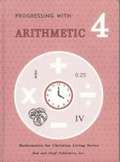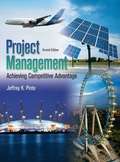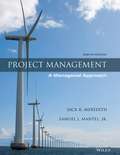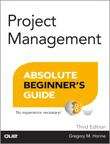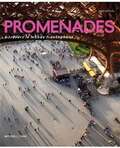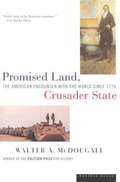- Table View
- List View
Progressing With Arithmetic Grade 4
by Lester Miller Timothy Conley Sandra BaumanThis hardcover textbook has 170 lessons, counting tests. Teaches the multiplication and division facts 10's-12's, long division, multiplying by 2-digit numbers, and checking. Reading problem skills include distance-rate-time, 2-step problems, using sketches, and identifying missing information. Also covers place value, decimals, Roman numerals, scale drawings, metric units of length, fractions, geometry, and graphs.
Project Based Inquiry Science: Vehicles in Motion
by Janet L. Kolodner Joseph S. Krajcik Daniel C. Edelson Brian J. Reiser Mary L. StarrProject-Based Science suggests that students should learn science through engaging in the same kinds of inquiry practices scientists use, in the context of scientific problems relevant to their lives and using tools authentic to science.
Project Management (2nd Edition)
by Jeffery K. PintoProject Management employs a managerial, business-oriented approach to the management of projects, which is reinforced throughout the text with current examples of project management in action. Introduction: Why Project Management?; The Organizational Context: Strategy, Structure, and Culture; Project Selection and Portfolio Management; Leadership and the Project Manager; Scope Management; Project Team Building, Conflict, and Negotiation; Risk Management; Cost Estimation and Budgeting; Project Scheduling: Networks, Duration Estimation, and Critical Path; Project Scheduling: Lagging, Crashing, and Activity Networks; Critical Chain Project Scheduling; Resource Management; Project Evaluation and Control; Project Closeout and Termination For readers or future mangers interested in understanding the fundamentals of project management from a variety of business applications and examples.
Project Management for Scientists and Engineers
by Merrie Barron Andrew BarronThe goal of the Rice University course Management for Science and Engineering (MSCI-610 - ENGI 610) is to provide the skills for science and engineering to meet the challenges of their future careers, whether they be in academia, industry, or as an entrepreneur. The course was started in 1998 and has evolved over the years. The course is taught to undergraduates, graduate students, and professional masters students and involves the areas of organizational behavior & leadership, accounting, marketing, strategy, entrepreneurship, and project management. It is this last area that is covered in this book. Irrespective of your future career in science and engineering you will be involved in projects and an awareness of the factors that enable a successful project is important for all team members. This course is not aimed at making you a certified project manager, but to provide the skills that will allow you to be a more effective project team member and also when you are dragged screaming and kicking into the role of accidental project manager.
Project Management from Simple to Complex
by Russell Darnall John M. PrestonIn a world that is becoming more virtual, more global, and more complex, the project manager's ability to function in this environment becomes critical to the success of the project. Project Management from Simple to Complex explores project management within this complex, virtual, and global environment. This is not a standard textbook that was adapted to the new publishing paradigm but was designed from the beginning to utilize its capabilities. The book is written in collaboration by an expert in Project Management--Russell Darnall--and an expert in writing instructional texts and using technology for communicating online--John Preston--to create a unique learning environment that prepares students to manage projects in a global, multicultural, and online environment.
Project Management from Simple to Complex Version 1.1
by Russell Darnall John M. PrestonIn a world that is becoming more virtual, more global, and more complex, the project manager's ability to function in this environment becomes critical to the success of the project. Project Management from Simple to Complex explores project management within this complex, virtual, and global environment. This is not a standard textbook that was adapted to the new publishing paradigm; it was designed from the beginning to utilize its capabilities. The book is written in collaboration by an expert in Project Management—Russell Darnall—and an expert in writing instructional textbooks and using technology for communicating online—John Preston—to create a unique learning environment that prepares students to manage projects in a global, multicultural, and online environment. Project Management from Simple to Complex features a new model for managing projects, as well as, exploration into the personal dynamics of project management and the role those dynamics play in project outcomes.
Project Management: A Managerial Approach (Eighth Edition)
by Jack R. Meredith Samuel J. MantelAs the use of project management to accomplish organisational goals continues to grow, skills related to understanding human behavior, evaluating organisational issues, and using quantitative methods are all necessary for successful project management. Meredith and Mantel have drawn from experiences in the workplace to develop a text that teaches the student how to build skills necessary for selecting, initiating, operating, and controlling all types of projects.
Project Management: Absolute Beginner's Guide (Third Edition)
by Greg HorineSucceed as a project manager, even if you've never run a project before! This book is the fastest way to master every project management task, from upfront budgeting and scheduling through execution, managing teams through closing projects, and learning from experience. Updated for the latest web-based project management tools and the newest version of PMP certification, this book will show you exactly how to get the job done, one incredibly clear and easy step at a time. Project management has never, ever been this simple! Who knew how simple Project Management could be? This is today's best beginner's guide to modern project management. . . simple, practical instructions for succeeding with every task you'll need to perform! Here's a small sample of what you'll learn: * Master the key skills and qualities every project manager needs * Lead projects, don't just "manage" them * Avoid 15 most common mistakes new project managers make * Learn from troubled, successful, and "recovered" projects * Set the stage for success by effectively defining your project * Build a usable project plan and an accurate work breakdown structure (WBS) * Create budgets and schedules that help you manage risk * Use powerful control and reporting techniques, including earned value management * Smoothly manage project changes, issues, risks, deliverables, and quality * Manage project communications and stakeholder expectations * Organize and lead high-performance project teams * Manage cross-functional, cross-cultural, and virtual projects * Work successfully with vendors and Project Management Offices * Make the most of Microsoft Project and new web-based alternatives * Get started with agile and "critical chain" project management
Project Star: The Universe In Your Hands
by Harold P. Coyle Harvard Observatory StaffFun activities to learn about the universe and astronomy.
Project-Based Inquiry Science: Animals in Action
by Janet L. Kolodner Joseph S. Krajcik Daniel C. Edelson Brian J. ReiserNIMAC-sourced textbook
Project-Based Inquiry Science: Astronomy
by Janet L. Kolodner Joseph S. Krajcik Daniel C. Edelson Brian J. Reiser Mary L. StarrNIMAC-sourced textbook
Project-Based Inquiry Science: Digging-In
by Janet L. Kolodner Joseph S. Krajcik Daniel C. Edelson Brian J. Reiser Mary L. StarrScience textbook
Project-Based Inquiry Science: Ever-Changing Earth
by Janet L. Kolodner Joseph S. Krajcik Daniel C. Edelson Brian J. Reiser Mary L. StarrLearning by Design TM derives from Problem-Based Learning and suggests sequencing, social practices, and reflective activities for promoting learning. It engages students in design practices, including the use of iteration and deliberate reflection.
Project-Based Inquiry Science: Good Friends and Germs
by Janet L. Kolodner Joseph S. Krajcik Daniel C. Edelson Brian J. Reiser Mary L. StarrNIMAC-sourced textbook
Project-Based Inquiry Science: Living Together
by Janet L. Kolodner Joseph S. Krajcik Daniel C. Edelson Brian J. Reiser Mary L. StarrNIMAC-sourced textbook
Project-Based Inquiry Science: Moving Big Things
by Janet L. Kolodner Joseph S. Krajcik Daniel C. Edelson Brian J. Reiser Mary L. StarrNIMAC-sourced textbook
Project-Based Inquiry Science: Weather Watch
by Janet L. Kolodner Joseph S. Krajcik Daniel C. Edelson Brian J. Reiser Mary L. StarrNIMAC-sourced textbook
Project-Based Inquiry ScienceTM: Diving Into Science
by Janet L. Kolodner Joseph S. Krajcik Daniel C. Edelson Brian J. Reiser Mary L. StarrNIMAC-sourced textbook
Project-Based Inquiry ScienceTM: Energy
by Janet L. Kolodner Joseph S. Krajcik Daniel C. Edelson Brian J. Reiser Mary L. StarrNIMAC-sourced textbook
Project-Based Inquiry ScienceTM: Genetics
by Janet L. Kolodner Joseph S. Krajcik Daniel C. Edelson Brian J. Reiser Mary L. StarrNIMAC-sourced textbook
Project-Based Inquiry ScienceTM: Vehicles in Motion
by Janet L. Kolodner Joseph S. Krajcik Daniel C. Edelson Brian J. Reiser Mary L. StarrNIMAC-sourced textbook
Projects in Speech Communication
by PLC Editors StaffA practical and comprehensive communication textbook with a hands-on communication project in every chapter!
Promenades: À travers le monde francophone
by Cherie Mitschke Cheryl TanoPromenades, 2nd Edition, focuses on building those skills introductory students need to feel confident while immersing themselves in authentic French culture.
Promised Land, Crusader State: The American Encounter With The World Since 1776
by Walter A. McdougallEntertaining, fast-paced, and learned, it exposes the myths that obscure the real meaning of such concepts as American Exceptionalism, Isolationism, Manifest Destiny, Wilsonianism, and Containment. Taking up the torch of George Kennan, McDougall proposes nothing less than to cleanse the vocabulary of our sterile post-Cold War debate on America's role in the world. Looking back over two centuries, he draws a striking contrast between America as a Promised Land, a vision that inspired the "Old Testament" of our diplomatic wisdom through the nineteenth century, and the contrary vision of America as a Crusader State, which inspired the "New Testament" of our foreign policy beginning at the time of the Spanish-American War and reaching its fulfillment in Vietnam.
